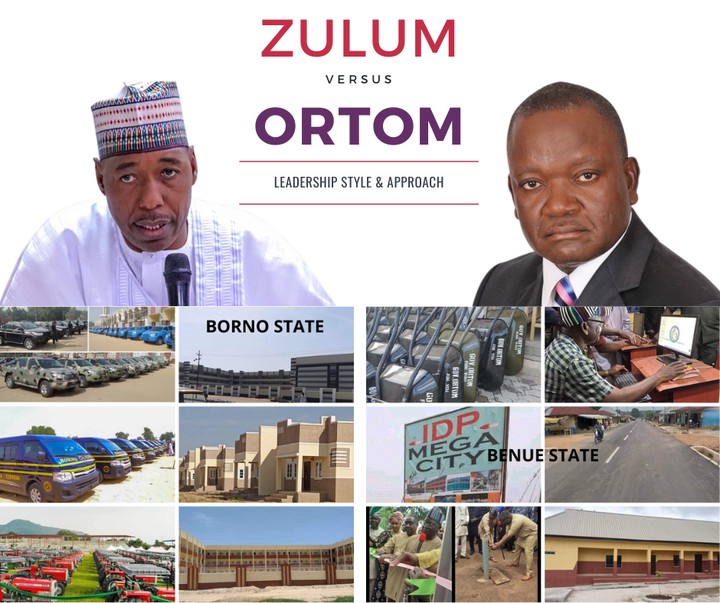Governance: Zulum Of Borno Vs Ortom Of Benue – Angula Bishop Reuben

The current governor of Benue State, Pastor Samuel Ortom, has sited insecurity as the reason his government has failed to deliver on his numerous campaign promises. So therefore, I have decided to compare his government with that of Borno State, which is the epicenter of insecurity in Nigeria, and how both governors are tackling insecurity.
Our people need to understand that poor leadership leads to insecurity. The quality of governance is central to any state’s ability to maintain order and bring peace to its territory. The challenges faced by both states are due to the accumulation of failed policies, poor leadership, and a lack of capacity over the years.
The security situation in our country has worsened with time and we have regrettably lost more lives than what we should have lost if we had better leaders who could deliver on their campaign promises across the nation after being elected into power by Nigerians during elections.
Benue State and Borno State are two states with many similarities, except in leadership style and approach.
Both states were created in the same year, in 1976. They have Muslim governor and a Muslim deputy governor in Borno State, the same way we have a Christian governor and a Christian deputy governor in Benue State.
They both start with the letter B and both have issues of security, although the magnitude of the security challenges in Borno State is far greater than that of Benue State. Both states share an international border with Cameroon, and both have fertile lands for agricultural purposes.
The security challenges in both states have created a huge humanitarian crisis, no doubt, with millions of internally displaced people.
Let’s take a look at how the governors of Benue and Borno are addressing the challenges below.
THE APPROACH BY THE BORNO STATE GOVERNOR
The Governor of Borno State, Prof. Zulum, understands that the insecurity situation in the country is a leadership deficiency, alleged to have been attributed to some key factors, which include corruption, poverty, unemployment, poor leadership, weak judiciary system, and poor government policies, etc., and the governor is doing everything humanly possible to address the root causes of these challenges with good governance, and today, the insecurity in Borno State has been reduced by more than 80%. His leadership approache has succeeded in chasing terrorists away from the North-East to the North-West.
Let’s take a look at what Zulum is doing in Borno State.
In his first 100 days as governor of Borno State, Prof. Zulum executed 120 projects. In one year, Zulum delivered 326 physical projects and 49 capital-intensive programs and policies.
Among Zulum’s 326 physical projects were more than 6,000 urban and low-cost houses for the resettlement of IDPs and refugees who fled from attacks by Book Harm.
The list includes 76 capital projects in education, which include new schools with 21st century facilities. There were 46 projects on health care services, which included 37 primary healthcare centers. 40 capital projects on infrastructure, which included new roads and the ongoing construction of Borno’s first flyover with upper and lower lanes.
Also in the list were 18 capital projects: rural and urban electrification; drilling of 213 new boreholes with distribution lines and rehabilitation of 335 existing boreholes; maintenance of the Maiduguri water treatment plant; and mega water facilities.
Using combined approaches to tackle Boko-haram and humanitarian outcomes, Zulum donated 300 operational vehicles (at once) and logistics to the Nigerian Armed Forces, he increased the monthly allowances of volunteers, like civilian JTF, and recruited over 1,000 vigilantes to help in the fight against terrorism.
Zulum also became Borno’s chief humanitarian officer, touring communities to supervise livelihood support.
Through investment, Zulum facilitated the restoration of civil authorities, agriculture, and self-employment through massive investment via a vocational training institute in Muna, which has 14 workshops for the training of displaced persons with a variety of entrepreneurial skills.
In his second year in office, Zulum surpassed the 326 projects delivered in the first year and has even launched a 25-year recovery and development plan, which has been implemented.
Today, he has delivered over 500 projects in the last three years, including 21 mega schools with 21st century facilities, which include primary, secondary, and sub-tertiary schools in 13 local government areas of Borno State.
Recently, during a late-night visit to General Hospital in Monguno, Zulum announced the approval of a 30% salary increase for doctors in seven local government areas with peculiarities.
Aside from medical doctors, nurses, midwives, lab technicians, pharmacists, and other health workers will also benefit from a 20% salary increment aimed at motivating them to deliver quality and affordable health care services.
In a similar vein, Governor Zulum unveiled 90 units of mass transit buses to enhance the operations of Borno Express Corporation, a public transportation services company owned by the state government.
The buses include 40 units of 50-seaters and 50 units of 14-seaters, all of which have a combined capacity of 2,740 passengers.
Zulum also approved and handed over a cheque of N12 billion for the payment of gratuities for 4,862 retirees owed by his predecessors.
Just recently, Zulum handed over 81 units of three-bedroom apartments along with cheques worth a total of N79 million to 81 medical doctors working in Borno State.
Let me stop here. Apologies to Zulum for not capturing all his achievements.
But through hard work, selflessness, commitment, and dedication to his people, he has emerged as a true servant leader who has restored hope in the midst of adversity.
THE APPROACH BY THE BENUE STATE GOVERNOR
The Governor of Benue State, Pastor Samuel Ortom, on the other hand, seems helpless about the root causes of the insecurity in the country and believes that it is by propaganda, crying or shouting, equipping his boys to insult his political opponents publicly, and jumping from one TV station to the other that will solve the problem.
Let’s take a look at what Ortom is doing in Benue State.
In his first 100 days as governor of Benue State, Samuel Ortom was begging Benue people for patience, for there were absolutely no projects to commission.
“He stated that his administration has achieved meaningfully within 100 days but will rather appeal to the Benue people to be patient with him because he is committed to running government with the fear of God, forgiveness, fairness, selflessness, reconciliation, and integration to enhance peace and development in order to remove the state from the shackles of poverty.” angry grin grin good man!
He made the above statement on the occasion of his 100th day in office without mentioning any single project.
After one year in office, Ortom renovated the School of Nursing and Midwives, Makurdi, Benue State, and empowered the youths with plenty of wheelbarrows to hustle.
Some of his notable achievements after seven years include the failed Amnesty Program; the enactment of the Anti-Opening Grazing Law with a faulty implementation; the construction of less than 1 km of roads in the state capital; the commissioning of a single borehole in Kwande; and the conversion of the Cargo Airport signage to IDP Mega City.
The achievements of Governor Samuel Ortom in seven years look like the achievements of councilors in the South. This is very shameful to say the least.
Benue State has become a brewery of hunger, poverty, unemployment, corruption, and underdevelopment under the leadership of Governor Samuel Ortom despite earning close to 1 trillion Naira through monthly allocation disbursed by the Federation Account Allocation Committee (FAAC), alongside the State’s Internally Generated Revenue (IGR), loans, bailout funds, Paris Club Refund, and other sources from June 2015 to December, 2021.
Yet our governor still owes teachers more than 13 months in arrears; 8 months for state civil servants; 12 months for local government staff; and 6 years for local government pensioners.
Yet Benue State is still struggling with a very high debt profile and insecurity despite receiving millions of security votes to protect the Benue people.
This clearly demonstrates that our Governor is the laziest public servant in Nigeria; he sits idle and waits for federal allocation from Abuja every month, unable to think outside the box in addressing our numerous challenges.
The achievements of Professor Babagana Umara Zulum in 3 years have not only surpassed the achievements of Governor Samuel Ortom in 7 years but those of Benue State since 2007 despite the insecurity challenges.
This is shameful and embarrassing, but 2023 has presented us with another opportunity to vote for credible candidates in order to end the activities of evil men with zero conscience parading as politicians in Benue State and the country at large.
I wish our constitution had allowed for the transfer of governors from one state to another.
Personally, I would have preferred the current Muslim/Muslim leadership in Borno State to the current Christian/Christian leadership in Benue State, and I would have applied for the transfer of that meaningful leadership in Borno to Benue.
NB: I predict that some people may find my comparison or exposition of these concerns inadequately balanced. For this allegation, I stand guilty as charged.
Again, I write not to satisfy men but to please God and my conscience.


